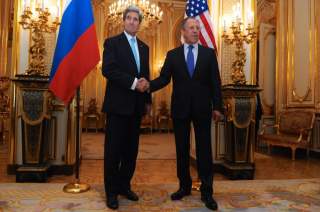Can Russia and America Work Together to Crush the Islamic State?
While Moscow and Washington face off over Ukraine, a much bigger and longer-term challenge presents a possible opportunity for collaboration.
With events in Ukraine continuing to progress by the day it may seem challenging to see such cooperation on the horizon. Yet emotion must give way to sober evaluation of our values and national interests. Another Cold War is in no one’s interest and would have other deleterious consequences in the face of the ISIS threat. With economic sanctions the new weapon of choice; many nations around the globe could certainly feel their impact—possibly pushing multiple European nations into a recession. Such a recession will eventually find its way to America’s shores, only slowing a painful economic recovery. All parties have an interest in avoiding further economic pain while focusing their needed attention on a much bigger and mutually shared challenge.
Russia Should Join the Fight Against ISIS
The most persuasive argument for reducing tension is the necessity for Russia and America to be united against Abu Bakr al Baghdadi’s destabilizing designs and the broader challenge of international terrorism. Russia can be helpful with America’s mutual allies, the Kurds. As the U.S. Congress and media call for a larger U.S. military deployment against ISIS, and the conflict turns to a protracted struggle, we will surely welcome their aid.
Russia might also help stabilize the influence of Iraqi Kurdistan. In the 1980s, Soviet leader Leonid Brezhnev, out of concern for his then-ally, Saddam Hussein, set the Russian relationship with the Kurds aside. In the last several months, hedging against the end of the Iraqi state and a future struggle with the ISIS caliphate, Putin has taken the first steps towards renewing his relationship with them. A prominent Russian analyst has since added his voice to calls for a further reconciliation. There’s a fruitful history to revive. Until the USSR built its alliance of sorts with Saddam, the Kurds shared intelligence with Russia and received training and weapons. Such efforts can be renewed. And Putin surely knows that Kurds have provided shelter to the region’s many embattled minorities. But as long as Russian bear is growling in Ukraine, it will not divert its energies to provide significant assistance to the Kurds, Yezidis and Christians in Iraq and Syria. That’s why a diplomatic solution in Eastern Europe can have an impact around the globe.
Putin and America’s Statecraft
The key lesson, as Robert Gates pointed out, is that we have to take Russia’s national interests seriously—not just our own. We failed to do so, he maintains, when Russia was weak and humiliated in the 1990s, and relations suffered. In Putin’s view, relations are deteriorating in the same mode today. While on opposite sides in the conflict over Ukraine’s future, both Russia and America must consider their long-term interests in destroying those who would do them both harm—a struggle that can be waged more effectively when the two cooperate. Russia and the West are not each other’s greatest political foes—and they might well prove the source of each other’s salvation from the ISIS menace. Recall that Franklin Roosevelt and Winston Churchill forged an alliance against the Nazis with Joseph Stalin, surely no Christian autocrat. As Churchill would quip, “If Hitler invaded hell, I would at least make a favorable reference to the devil in the House of Commons.” We’d do well to remember today which devils we can tolerate—and which we must destroy.
Jiri Valenta, veteran Russologist, has served as a consultant to four U.S. administrations. He is a member of the Council on Foreign Relations.
Leni Valenta is a writer-editor for their website, jvlv.net.

